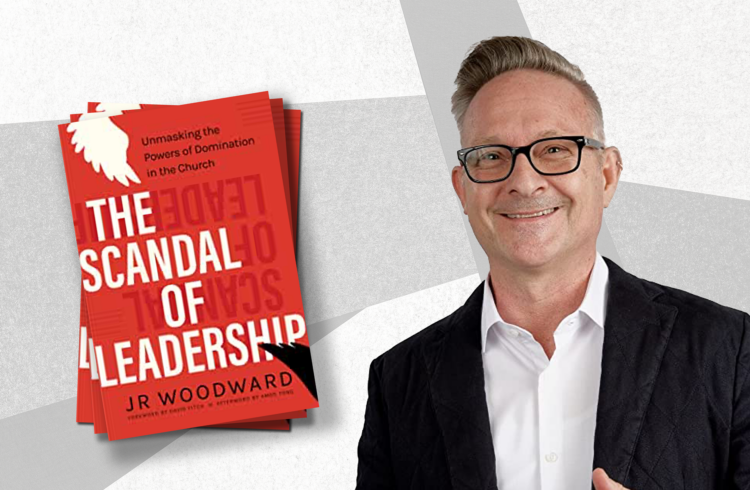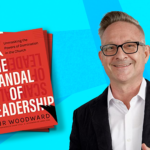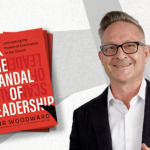*Editorial Note: JR Woodward is one of the founders of Missio Alliance, and a long-time partner with Missio in the holistic development of the local church across North America. Currently he serves as the National Director for Church Planting with V3. His newest book, The Scandal of Leadership, releases at Awakenings 2023 this week, and touches on the intersection of many core issues we will dialogue about during our National Gathering in Chicago. Over the next 3 days, we will preview the introduction to JR’s book as a means of engaging critical leadership content, and as a (written) window into the in-person dialogue we will have together at Awakenings.
JR is graciously donating a portion of his book profits to the ongoing work of Missio Alliance, so if you feel led, you can purchase his book here.
If you’d like to participate virtually in Awakenings 2023, you can still purchase livestream access here, joining us virtually April 27-29, 2023! ~CK
Introduction to The Scandal of Leadership, Part I
Life is a paradox. We are all a mix of good and bad; we are beautiful and broken. We often have mixed motives. Sometimes, as leaders of families or churches, we become controlling. However, when we start to become domineering leaders in the church as a way of life, it leads to our fall, where we are either fired or compelled to step down. Falling does not have to be permanent, “for though the righteous fall seven times, they rise again” (Prov. 24:16a). Our fall does not have to fully define us. But if we fail to repent, it often will.
In writing my book, The Scandal of Leadership, I write with hope for the fallen and as a vaccination for those who have not fallen but are capable of doing so (which includes us all). I want to describe a reality where we, as flesh-and-blood people, recognize the unseen dark forces that work against us, because if we fail to name, unmask, and engage them, we are likely to fall.
The stories of those who have fallen — those I mention by name — do not have to be the last word for their lives. In order to give a deeper diagnosis to concrete realities, I share what is public knowledge for all, in the hope that we can build immunity against the plague of domineering leadership.
For those of us who have been hurt by the leadership of others, we do not have to allow that hurt to define us. We can forgive even if we cannot reconcile with others, for forgiveness takes just one person, but reconciliation takes two and involves repentance from the wrongdoer.
Although I write with a sense of hope, we must first confront the brutal truth of our current cultural moment. I want to describe a reality where we recognize the unseen dark forces at work against us, because if we fail to name, unmask, and engage them, we will likely fall. We must build immunity against the plague of domineering leadership. Click To Tweet
THE FALLEN
In July 2011, C. J. Mahaney, former president of Sovereign Grace Ministries, took a leave of absence after confessing to “expressions of pride, unentreatability, deceit, sinful judgment and hypocrisy.”1 In April of 2013, he resigned from his role.
Steve Timmis, former Acts Twenty-Nine CEO and pastor of The Crowded House in Sheffield, UK, resigned in February 2020. “Fifteen people who served under Timmis described to Christianity Today a pattern of spiritual abuse through bullying and intimidation, overbearing demands in the name of mission and discipline, rejection of critical feedback, and an expectation of unconditional loyalty.”2
And in August 2014, Mark Driscoll, founding pastor of Mars Hill and co-founder of the Acts Twenty-Nine church-planting network, was asked to leave the leadership of Acts Twenty-Nine. He was also forced to resign from Mars Hill in October 2014. In his resignation letter, he confessed to “past pride, anger and a domineering spirit,”3 as well as admitting to paying a company to purchase his book from enough key markets to get him on the New York Times Best Seller list.4
These are but a few of the most high-profile cases of domineering leadership in recent years. Most of us are aware of this recent spate of pastors publicly “falling.” In their wake there have been books, articles, and podcasts that have sought to identify and understand the underlying causes of such leadership. This is an important moment for the church. Cases that may once have been swept under the rug are now being exposed, and we have an opportunity to change.
GETTING TO THE ROOT OF THE ISSUE
However, this is only possible if we get to the root of the issue. Dandelions may be nice-looking flowers, but most consider them to be weeds, and the only way to remove them is to deal with them at the root. Dandelions have taproots that can extend several feet into the soil, so simply pulling them out at the surface will never solve the problem. In the same way, if we are going to deal with domineering leadership in the church, we need to move beyond the presenting surface issues and get to the root of the problem. To do so will require a robust diagnosis of the issue.
I not only seek to link the fall of church leaders to patterns of domination, but I also hope to demonstrate a link between imitation and the Powers. I want to explain how leaders who uncritically imitate patterns of power seen in the fallen world are liable to fall into patterns of domination. These patterns can vary in intensity and impact, and it is easy to assume that such domination tendencies happen to “other people” in “other places.” Yet, to one degree or another, we are all fallible in this area. If we exercise any degree of self-reflection, each and every one of us can no doubt identify times in our lives when we have wielded power inappropriately, whether that be manipulating people for our own gain, intimidating others, or being overly defensive. Indeed, I have felt the grip of power in my own life — seeking people’s applause is a temptation with which I continue to struggle. The Scandal of Leadership was born out of a desire to help myself as much as to help others. There are too many heartbreaking stories and too many people who have been hurt as a result of this form of leadership. I am passionate about seeking preventative measures that deal with the problem of domineering leadership in the church. Leaders who uncritically imitate patterns of power seen in the fallen world are liable to fall into patterns of domination. Yet, to one degree or another, we are all fallible in this area. Click To Tweet If we exercise any degree of self-reflection, every one of us can identify times in our lives when we have wielded power inappropriately; perhaps manipulating people for our own gain, intimidating others, or being overly defensive. Click To Tweet
THE SUBTLE DANGER OF CROWDS
The North American church has, by and large, assimilated with contemporary culture, and we now subconsciously assume that those with the largest churches are the most “successful.” “How many people attend your church?” is the first question pastors ask of one another, as if this is the primary way to discern the faithfulness of ministry. I have never been asked, “How many people in the church you serve reflect the fruit of the Spirit?” or “How many people in the church you serve seek to live in the world for the sake of the world in the way of Christ?” Taking our lead from wider culture, our churches have become obsessed with celebrities, and we put our pastors on pedestals. Either implicitly or explicitly, we have believed the lie that our key aim is to “build a crowd” and that all of our best efforts should be geared toward this goal. But rarely are we aware of the subtle dangers this presents. Our churches have become obsessed with celebrities, and we put our pastors on pedestals. We believe the lie that our key aim is to “build a crowd.” But rarely are we aware of the subtle dangers this presents. Click To Tweet
It would seem that Jesus was not impressed by the crowds. His first message recorded in Luke ended with him escaping the crowd before they were able to throw him over a cliff (Luke 4:28–30). In an article titled “Jesus and Crowds — An Unhappy Marriage,” Karl Vaters notes that “Jesus didn’t value crowds. He didn’t even trust them (John 2:23–24). But he valued the people in them.”5 Vaters makes the point that the largest crowd recorded in Scripture was the one present at the feeding of the five thousand, which is sometimes used to justify the importance of spending the majority of our time, talents, and resources to build crowds so we can be like Jesus. However, Vaters challenges this logic, pointing out that on this particular occasion, Jesus was actually trying to escape the crowds, but they followed him to a remote place. Because of his love for the people, he had the disciples feed them.
Jesus frequently tried to escape the masses, and his message was never defined by them — he regularly said things that made the crowds dwindle, to the point of asking his disciples if they too were going to leave him (John 6:67). His identity was grounded in the Father — not in how many came to hear him speak.
When we become infatuated with the crowds, we become possessed by our image instead of possessing our image in God. Infatuation with the crowds has formed pastors who look and act like rock stars, and it has created a celebrity culture within the church. This seems to be a breeding ground for domineering leadership. We are taken by the charismatic personalities that draw the crowds, and the more the crowds flock, the more we deify our leaders. In such scenarios, leaders are viewed as beyond reproach, and domineering leadership often ensues. This has only been accentuated with the dawn of social media and the elevated platforms that come with it. We are taken by the charismatic personalities that draw the crowds, and the more the crowds flock, the more we deify our leaders. In such scenarios, leaders are viewed as beyond reproach, and domineering leadership often ensues. Click To Tweet
In his memoir, The Pastor, Eugene Peterson — the antithesis of the domineering styles of leadership prevalent in the North American church — recalls how he once wrote to a fellow pastor who was drawn by the appeal and prestige of the crowds. Philip, the pastor in question, had been part of the “Company of Pastors” — a group Peterson had helped form as a way of bringing mutual encouragement and development for the pastors who were part of it.
Philip announced one day that he was leaving his congregation in order to pastor a church with a thousand members — three times the size of the church he was currently pastoring — because it was “more promising.”6 Despite the ethos of the group, Peterson recognized that Philip had “absorbed a concept of pastor that had far more to do with American values — competitive, impersonal, functional.”7 This bothered Peterson, not because Philip was changing churches, but because “Phillip’s reasons seemed to be fueled by something more like adrenaline and ego and size.”8 So after meeting with him one-on-one to no avail, Peterson wrote Philip a note. Within this letter, Peterson gives some wisdom regarding the crowds. Recalling their personal conversation, Peterson shares his concerns about how Philip seemed too enthralled by the prominence of this church, and he warns of the dangers it poses. He talks about how size is the “great depersonalizer,” quoting Kierkegaard’s wisdom: “the more people, the less truth.”9
Peterson goes on to note how Christian maturity comes through “intimacy, renunciation and personal deepening. And the pastor is in a key position to nurture such maturity.”10 Maybe that is why Jesus devoted himself to the Twelve instead of to the crowds, and maybe it is why he commissioned us to make disciples rather than host large services. We are wise to take heed of Peterson’s reflections. The following was penned in his personal memoir toward the end of his life:
Classically, there are three ways in which humans try to find transcendence — religious meaning, God meaning — apart from God as revealed in the cross of Jesus: through the ecstasy of alcohol and drugs, through the ecstasy of recreational sex, through the ecstasy of crowds. Church leaders frequently warn against the drugs and the sex, but, at least in America, almost never against the crowds. Probably because they get so much ego benefit from the crowds.
But a crowd destroys the spirit as thoroughly as excessive drink and depersonalized sex. It takes us out of ourselves, but not to God, only away from him. The religious hunger is rooted in the unsatisfactory nature of the self. We hunger to escape the dullness, the boredom, the tiresomeness of me. We can escape upward or downward. Drugs and depersonalized sex are false transcendence downward. A crowd is an exercise in false transcendence upward, which is why all crowds are spiritually pretty much the same, whether at football games, political rallies, or church…But I really do feel that crowds are a worse danger, far worse, than drink or sex.11 Eugene Peterson notes in his memoir, 'The Pastor,' how Christian maturity comes through 'intimacy, renunciation and personal deepening. And the pastor is in a key position to nurture such maturity' (p. 156). Click To Tweet
///
REFLECTIVE QUESTIONS TO PONDER
-
- How have you been affected by the spate of Christian leaders who have fallen recently?
- What do you consider to be the root issue of their fall?
- How has our infatuation with the crowds added to the problem of domineering leadership?
///
JR Woodward, PhD (University of Manchester, UK) loves to awaken people to join God in the renewal of all things. He is a catalyst who has been passionately starting churches and ministries for the good of the world for over twenty-five years. He co-founded Missio Alliance and currently serves as the National Director for the V3 Church Planting Movement. He is an adjunct professor at several seminaries and universities, including Central Seminary and Missio Seminary. He is the co-founder of the Praxis Gathering, and serves on six different boards, including Reliant Mission, Movement Leaders Collective, and Fuller Global Mission Advisory Council. He is the author of Creating a Missional Culture, and co-author of The Church as Movement. His most recent book The Scandal of Leadership is based on his PhD research, and written to provide a remedy to the problem of domineering leadership in the church. He loves to surf, travel, read, and skateboard as well as meet new people. He enjoys photography and film and tries to attend the Sundance Film Festival whenever he can. Find him online at jrwoodward.com.
Footnotes
1 Bobby Ross Jr., “Sex, Money . . . Pride? Why Pastors Are Stepping Down,” Christianity Today, July 14, 2011, https://www.christianitytoday.com/ct/2011/ julyweb-only/sexmoneypride.html.
2 Kate Shellnutt, “Acts 29 CEO Removed Amid ‘Accusations of Abusive Leadership,’” Christianity Today, February 7, 2020, https://www.christianitytoday.com/ news/2020/february/acts-29-ceo-steve-timmis-removed-spiritual-abuse-tch.html.
3 Sarah Pulliam Bailey, “Exclusive: Mark Driscoll’s Resignation Letter to Mars Hill Church,” Religion News Service, October 15, 2014, https://religionnews. com/2014/10/15/exclusive-mark-driscolls-resignation-letter-to-mars-hill-church/.
4 Ken Walker, “Is Buying Your Way Onto the Bestseller List Wrong?” Christianity Today, January 20, 2015, https://www.christianitytoday.com/ct/2015/januaryfebruary/buying-bestsellers-resultsource.html.
5 Karl Vaters, “Jesus and Crowds—An Unhappy Marriage,” February 20, 2023, https://www.KarlVaters.com/jesus-unhappy.
6 Eugene Peterson, The Pastor: A Memoir (New York, HarperCollins, 2011), 156.
7 Ibid.
8 Ibid.
9 Soren Kierkegaard, The Crowd is Untruth (Pinkerton, OH: Beloved Publishing, 2015), 15.
10 Peterson, The Pastor, 156.
11 Ibid., 157–158.




Missio Alliance Comment Policy
The Missio Alliance Writing Collectives exist as a ministry of writing to resource theological practitioners for mission. From our Leading Voices to our regular Writing Team and those invited to publish with us as Community Voices, we are creating a space for thoughtful engagement of critical issues and questions facing the North American Church in God’s mission. This sort of thoughtful engagement is something that we seek to engender not only in our publishing, but in conversations that unfold as a result in the comment section of our articles.
Unfortunately, because of the relational distance introduced by online communication, “thoughtful engagement” and “comment sections” seldom go hand in hand. At the same time, censorship of comments by those who disagree with points made by authors, whose anger or limited perspective taints their words, or who simply feel the need to express their own opinion on a topic without any meaningful engagement with the article or comment in question can mask an important window into the true state of Christian discourse. As such, Missio Alliance sets forth the following suggestions for those who wish to engage in conversation around our writing:
1. Seek to understand the author’s intent.
If you disagree with something the an author said, consider framing your response as, “I hear you as saying _________. Am I understanding you correctly? If so, here’s why I disagree. _____________.
2. Seek to make your own voice heard.
We deeply desire and value the voice and perspective of our readers. However you may react to an article we publish or a fellow commenter, we encourage you to set forth that reaction is the most constructive way possible. Use your voice and perspective to move conversation forward rather than shut it down.
3. Share your story.
One of our favorite tenants is that “an enemy is someone whose story we haven’t heard.” Very often disagreements and rants are the result of people talking past rather than to one another. Everyone’s perspective is intimately bound up with their own stories – their contexts and experiences. We encourage you to couch your comments in whatever aspect of your own story might help others understand where you are coming from.
In view of those suggestions for shaping conversation on our site and in an effort to curate a hospitable space of open conversation, Missio Alliance may delete comments and/or ban users who show no regard for constructive engagement, especially those whose comments are easily construed as trolling, threatening, or abusive.